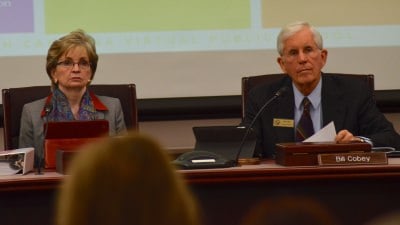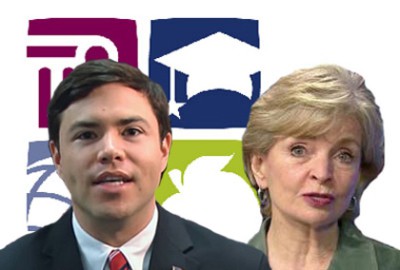N.C. Rep. Craig Horn, an influential budget writer from Union County who chairs the House education appropriations committee, isn’t sure he likes the current salary scale for teachers, the one adopted by lawmakers two years ago that nixes annual raises for teachers in favor of a multi-tiered approach with bigger pay bumps every five years.
He’s not sure he likes Gov. Pat McCrory’s idea either— a 5 percent average pay increase coupled with a return to yearly salary increases for teachers.
Today, in fact, the only thing that Horn seems sure of is that he’s not sure at all.
“We don’t want to force teachers out of the classrooms,” says Horn. “That’s front-page, top of the fold for me. But, as a legislator, I have to be circumspect.”
McCrory’s budget proposal, drafted in the midst of an increasingly bitter, and close, re-election-campaign came weeks after N.C. Superintendent of Public Instruction June Atkinson and House Speaker Tim Moore bandied about ideas for teacher pay. The former suggested a 10-percent, across-the-board raise; the latter indicated 2 percent was far more realistic.
But, this week, with Horn’s committee meeting to grind out the details of the state’s education budget, the rhetoric meets the reality.
Prominent in the discussions surrounding teacher pay, in addition to the one-time bonuses proposed by McCrory and raises targeting early-career teachers, will be the state’s salary schedule for educators, an ever-shifting model that, since it was revised by legislators in 2014, drops teachers into multiple pay tiers.
Under the current model, teachers would receive modest pay increases for every five years of experience, compared to earlier incarnations that reward teachers with higher pay on an annual basis.
McCrory’s proposal this month eschews the former for the latter, reportedly to assuage growing concerns that young, qualified teachers—frustrated by lax pay and a grindingly slow salary schedule—are migrating outside the state for work.
Under North Carolina’s current salary schedule, it would take teachers in the state 25 years to cap out at $50,000. McCrory’s plan reaches that number a little sooner, at about 20 years.
Yet, as budget negotiations intensify, it remains to be seen whether lawmakers such as Horn will side with the governor. Horn called the governor’s proposal “aggressive and exciting” this week, but pointed out top budget lawmakers are reluctant to commit without first considering long-underpaid state employees too.
“There are a lot of members who are equally concerned about retaining and rewarding our police and other state employees as they are about keeping or retaining our teachers,” said Horn.
Meanwhile, public education advocates—meeting to deride teacher working conditions on National Teacher Appreciation Day—were less than enthused about McCrory’s budget this week, casting it as little more than electioneering from a governor embroiled in an apparently uphill fight for re-election.
“We’ve got to develop a plan they’re going to commit to,” says Rodney Ellis, president of the N.C. Association of Educators (NCAE), the state’s largest teacher advocacy organization. “It can’t be, every time there’s an election year, come out with an astronomical proposal.”
***
Sen. Angela Bryant, a Democrat from Rocky Mount, says she knows what teachers have sacrificed in North Carolina. “They give from the heart,” she said this week. “Because, surely, they are not teaching in this profession for the money.”
Bryant and a host of education leaders in the General Assembly and advocacy organizations presented a laundry list of demands this week in the legislative building that they say will “restore respect” to the state’s teachers.
Their list, among other wish list items, includes paying teachers at the national average, about $56,000; increased per-pupil spending; raises for school administrators; restoring teacher tenure rights; reforming a school A-F grading system that they say disproportionately factors in test scores over student growth; and funding a scholarship program aimed at prepping new teachers.
The salary schedule, as long as it caps out at just $50,000 for many teachers, is clearly low on that list, according to Ellis of the NCAE. Yet it remains a pivotal point in the governor’s much-discussed budget proposal.
North Carolina’s teacher salary schedule has seen many changes over the years, says Philip Price, chief financial officer for the N.C. Department of Public Instruction (DPI).
And while educators have seen modest, infrequent pay raises since 1992 (see this DPI document, page 16), the state still relied on a “step” system that provided pay increases on an annual basis for teachers until two years ago, Price says, as GOP lawmakers began overhauling the state’s teacher pay system.
The discussion emerged anew with McCrory’s budget announcement last month, a budget that conservatives like Horn hail for its focus on teacher pay, which as of the last national rankings, lingered at 42nd in the nation. Democrats and public education advocates were unimpressed.
It also comes as public education advocates, including the leadership of the NCAE, hammer the $50,000 cap on teachers with a bachelor’s degree. Teachers with a bachelor’s and certification from the National Board for Professional Teacher Standards top out at $56,000, while teachers with a master’s degree and board certification could make up to $61,000 based on the state standard.
This week, Ellis with the NCAE scoffed at the idea of McCrory’s return to an old salary schedule. “They keep messing with things that aren’t broken,” Ellis said, adding that he’s skeptical the “lofty ideals” of the governor’s pay plan will come true anyway.
Ellis’ ideas were mirrored by outspoken public education advocates in the legislature, who poured it on McCrory this week, arguing the governor needs to show a stronger commitment to funding schools and teachers.
“Folks are going to have to do more than put out a proposed budget that’s dead on arrival and say, ‘I’ve done my part,’” said Rep. Larry Hall, a Democrat from Durham who leads the party in the state House. Hall added that it’s a “disservice to our children” that North Carolina teachers aren’t at least paid at the national average.
Sen. Dan Blue, the Democratic leader in the state Senate, echoed Hall’s sentiments. “We present (teachers) with unattainable goals and provide them with inadequate resources to achieve those goals,” said Blue.
For Rep. Graig Meyer, a Democrat from Orange County and a former school social worker, it’s personal. This week, Meyer cited multiple family members in the education profession and lambasted GOP leadership for approving laws that undermined interest in the teaching profession.
As Policy Watch reported in February, the UNC system has reported a prodigious, 30 percent drop in students seeking education degrees since 2010.
“They make teachers feel like they’re part of the problem, and not the solution,” said Meyer.
McCrory’s senior education advisor, Catherine Truitt, did not respond to interview requests this week to talk the proposal, but, despite the criticism from Democrats, McCrory’s office has continued to promote his budget plan this week. On Tuesday, coinciding with National Teacher Appreciation Day, his re-election campaign launched an online petition for his budget pay proposal.
Meanwhile, Rep. Horn said Republican leadership in the legislature is well-aware of the declining interest in teaching in North Carolina. “It’s terrible out there across the country,” said Horn. “We’ve got to attract and retain quality teachers. We start by having a pay scale that makes reasonable sense.”
On Tuesday, as part of a Democratic-led effort to allay the problem and incentivize teaching in North Carolina, lawmakers such as Meyer filed draft legislation to commit $38.5 million of lottery receipts for a teacher student loan repayment program.
But to Horn and certain other powerful Republicans, the prime solution could be to reform the state’s salary schedule to implement differentiated pay, separating certain, hard-to-fill positions and offering financial incentives.
Horn also questioned whether teachers would prefer smaller, annual pay increases or more substantial raises every few years. Additionally, Horn said lawmakers will have to mull the impacts of their policies on school districts that attach local teacher supplements to state salary, noting the legislature’s actions could balloon local budgets.
“There’s not one person in our whole state who doesn’t think our teachers deserve a raise,” added Horn. “I certainly do. I believe they deserve a substantial raise. (But) the question of the day is: What can we afford to do?”
The answer to that, some education advocates would say, may have come Wednesday from Rep. Ed Hanes Jr., a Democrat from Forsyth County who co-sponsored Democrats’ lottery funding bill. With lawmakers answering press questions about how likely their teacher loan program was to succeed, Hanes and company indicated it’s simply about priorities.
“I’ve been around here long enough to know there’s absolutely nothing this assembly can’t do if we want to do it.”
Editor’s Note: This article was published by NC Policy Watch on May 4, 2016.



